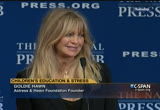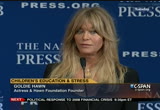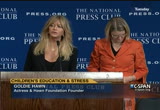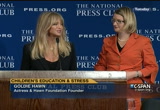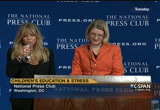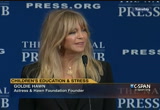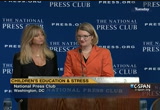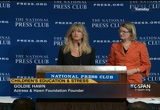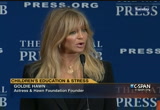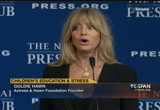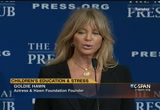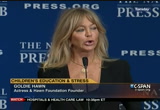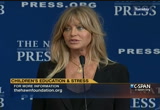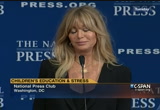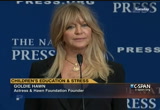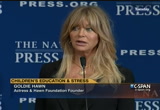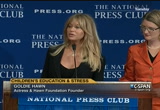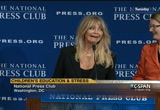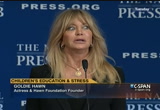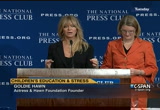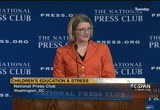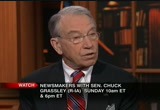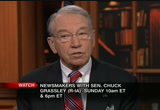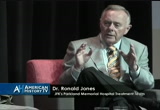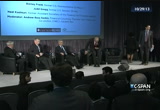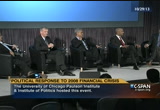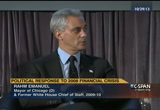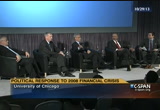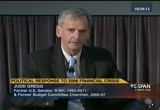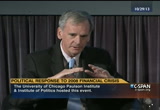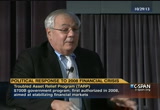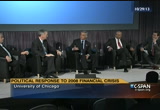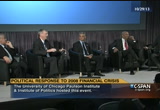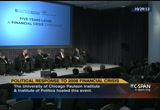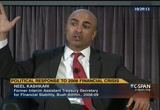tv Future of Hospitals CSPAN November 9, 2013 9:00pm-9:46pm EST
9:00 pm
a healthy manner? they're managing their stress. and about it is just traffic. children.lked we have said this will never go. you are never going to be able to take three brain breaks a day in the class. as it turned out, this was a program that has worked. it has worked. and we are now in six countries. i never believed it to be. the most important thing in my life to see that one day, we adopt these principles in every classroom in america. because if we do not give our children the chance, we are going to be in trouble. they cannot face this new world we are living in without these tolls. -- tools. [applause]
9:01 pm
thank you very much. [applause] >> thank you. we have a lot of questions on a lot of topics. how can you succeed in promoting self reflection and meditation when every kid seems attached to their iphone or device? any recommendation for dealing with constant electronics with all of the issues you are talking about? >> i am writing a book right now. and what we are doing is talking about the internet and these devices. it is called to disconnect. what we are learning is about to the internet, it is not all bad. it is rewiring the brain and certain ways that is very important. not just the advent of the
9:02 pm
invention of the toll's have we grown so much in terms of neurological activity. however, what we are missing there is the social and emotional aspects. we are losing our connection to each other. what happens when you quiet the call it.what we we do not collect meditation. mind, we doet the it three times a day for two minutes. what the children learned if it quiets down the limbic system oh stop it has a different -- system. -- it has different areas. that is a very reactive substance part of the brain. when you breathe and focus and sit there for a while, put our heads on our desks. it is similar to allowing yourself to relax and be calm. they learn it changes the prefrontal cortex and the lights
9:03 pm
it up. , we they quiet the amygdala do get it back in the doghouse, they know what happens neurologically. , it is not whoo, whoo science. how we understand we can manage our brain. when it lights up, with the prefrontal cortex, they can think and make decisions and analyze and learn and remember. >> mindfulness training has taken off. you talked about why we need that. what can educators take away from these approaches as they aim to steer the overachieving students, those who may have stresses in their personal lives outside of school? >> a very good question. has been in use in the inner- city, at risk kids, that is what people think when you're out -- out helping children.
9:04 pm
the research has been done, children affluence are just as much as risk. they are the ones who take their lives. affluent children are the ones who self medicate. they are the ones who have anxiety disorders and depression. these are the things we look at and say, this is an aspect of how we learn to manage what ever our fears are. it is always done by uncertainty and fear. these are very human issues. have anything to do necessarily where you are and what station. it helps everybody across the board including our teachers. >> a member of our audience who is a practicing child psychologist said a word you start with the program in elementary school and persuade -- where do you start with the program in elementary school and
9:05 pm
persuade the schools? >> the proof is in the pudding. would you show the results and youget the kind of activity are getting, what is happening is it is becoming instead of a push, it is becoming a pool. pulleason it is a pool -- because we are throwing our hands up and said what can we do? we get a school district that is ready and you say we can help him manage your children, we can help, become, more self managed themselves. to reduce bullying. -- we can reduce a bullying by creating a community and a teaching about timothy and -- empathy and teaching optimism versus pessimism. it science -- it sounds crazy. you know the research of just gratitude itself and a research study that was done has pulled
9:06 pm
people out of depression states. out of beds. a simple way of doing that. why? the brain starts to relearn it different things. what is it -- wired to get you fired? -- when you have a positive experience such as gratitude, it starts to change how you fire. how your brain thinks. it likes it. not so good, sometimes it is. that is what we do with our children. i am running on here. >> students today take more high state test. is it concerning and what should be done about? >> i think testing is actually an interesting thing. we all go about in different ways.
9:07 pm
testing it is up for grabs. does it matter if a child gets a high grade? what we found is emotional iq is an indicator of a much more successful life and life experience than a very, very high iq world you have a rocket scientist out there that does not densely live an integrated life. does not necessarily live an integrated life. there are problems with testing. i will say this. just like the internet, it is progress and where we are. testing will not end. it will not stop. how do we move around it? that is what we teach our children. the choices are have learned how to reduce stress during testing? have you been able to use our tohniques so we know tools do and i will reach my toolbox?
9:08 pm
how will i get around i am not smart enough? that is how we do it. >> an article described you as having said children are profoundly unhappy. what a letter to that observation and in what way? >> first of all, that is a written word and we do not always go by that. is childrenink deserve to be happy. and today have every right to be happy. i think it is our job as of the grown-ups, the guiding light, to nurture. into the best state of mind they can be and to create some level and reservoir of joy in their lives to get into a know it is theirs alone. >> newfound challenges
9:09 pm
introducing the program in schools in any particular region . have you encountered difficulty in more conservative areas? >> a believer not, not too many complaint -- believe it or not, not too many complaints. we are a science-based program. if we are teaching about the brain, we are going to learn about all kinds of things. know what to their emotions are doing to the brain and how the brain is reacting. it is a conversation we have to between the brain and our exterior alike. in terms -- i really have not to tell you the truth. have any of your research a link to the increasing violence in the schools with the stresses and fears that young people are feeling these days? >> say that again. >> any scientific link between >> there'sd stress?
9:10 pm
a scientific link. you have to rise up and ask the question, what are we doing, what are we doing wrong? our children are very stress. it creates anger. when you are afraid, even a chilly if that there is not -- eventually if that there is not result it will turn into anger. our children are acting out. oddly enough, a lot of the school shootings, i cannot turn on the news anymore, i cannot see this level of fear and frustration and ugliness and illness -- mental illness that seems to be rampant now. these people are on the loose. gonzaga relatively easy to get. i do not want to get into that part. -- guns are relatively easy to get. ourfully, the people and good world and leaders will be able to take charge for us. hand, as far as the children are concerned, we are
9:11 pm
seeing a lot of scientific problems. one of them is when they go off of their medication, there is potential psychoses. we have seen it. some of these children are troubled, have they gone off of their medications? are they the wrong medication? or are they getting too many? this is where it gets scary. yes, there is scientific proof of stock -- proof. >> have you gone to federal officials and is a part of the visit to d.c.? >> no, it is not part of my visit. my home and my government needs to service in the right way. think there will be a time when we will move forward with speaking more about this. an opportunity today to speak to people who are
9:12 pm
changemakers, who can understand the dilemma. our education system and to change all stop i think there are ways to create the good argument and premises and understand the private sector -- with cannot depend on the private sector. millions of dollars going out. that is helping and understanding the problem to get more mental health and health care in the schools. programs in terms of and understanding all of that. it is not going to make it. scaling is very difficult. mike lee here would be -- my plea would be, how do we scale it on our own? from the top down. not dependent upon the government, we are all a chance takers and disturbance makers. that is the only way to grow. i would like to say, yes, i am
9:13 pm
here to speak about this and have the conversation and hopefully, somebody is listening. [applause] >> given the success of the sundance channel's dream school children, have you considered wholly pure acting and work with this initiative on television? >> i have had my head down for 11 years. boots on the ground looking at research and understanding the value of what we are doing. we are in six countries. not a push. we are not the only country. we are giving a more psychotropic drugs than any other country. our children are probably living -- 50% are living below or at
9:14 pm
the poverty level. how can a child go to school and think when they only have one meal a day? we have some serious challenges here. do, mys of what i answers,. what we are doing is creating animation. andation in terms of apps helping children understand how their brain work. we are critical real animation to teach them and understand the skills. how we apply it to the various things we are doing in the schools. we are doing that. is there a channel to be doing this? absolutely. i have gone to different channels earlier. i was not ready. sometimes it takes him to incubate a program. our program is flying. way. time to work that i thought i had two hats. i thought i was doing foundation work.
9:15 pm
i brought in some the things i do. that's what we are doing now. curriculum mindup work for children would have a typical brains? in ourave had this problematic areas for sure. i've heard wonderful feedback. we have no quantitative research. have worked within them. i have one story. that was a little boy with autism and he was in the classroom. he was very nervous. he was going to take a test. he became symptomatic. he cannot stop shaking his hands. he cannot stop reacting. one of the little boys and said can we sit in a circle and do our brain break? i think he needs it. children were very empathetic.
9:16 pm
she said, of course. we sat down and they did their breathing and focusing. the child stopped shaking. everybody felt good. they were supporting him. with the prescriptive work. is inl us where mindup practice and for those of us who schools do not have it, where can people find out more information? >> you can find on our website. foundation.org. we are ready and willing to do it. toited to get the calls and train. we have trainers that are ready to go. we also have a website that is coming out which is in learning portal. that'll be a no other way. what was the other question? was there another part?
9:17 pm
we are in 15 different states. -- i tell you the truth, it keeps growing. we have canada. ofhave hundreds of thousands children during the program around the world. it is not enough. >> we could fill in the whole our about the talk of the foundation. there are questions on other topics. we will start with one from a 10 year old who wants to know what character do you play in phineas and herb? >> and that is so fun. [laughter] the grandmother. she sat in the window. i do not know if i would do a repeat. talking in like this [ old lady voice.]
9:18 pm
>> you must have a favorite movie or is it like a child you cannot pick? do you have a favorite movie experience? >> wow. it is hard to choose one. just to satisfy that, i've had a lot of great experience. doing "overboard" was a dream. we had our children. we had a new baby. he was eight months old. it was a dream to make that movie. it really was. in terms of the other part, ss," was one ofre my most exciting movies. it was with steven spielberg. i was playing a different type of character. a funny person is great and i loved it. i get it.
9:19 pm
god put me here for a reason. sometimes, you get to do something different. i did. she was not a comedic character is that she was very tragic for stop she was entertaining. -- character. -- she was very tragic. -- she was entertaining. >> wendell might we see you and -- when might we see you and kur t on the screen again? >> probably not. i will tell you why. unless it was an interesting thing and a small role -- who knows? when people have been together for so long and would been together for 30 years -- [applause] there is a love for those people but no mystique about them anymore. [laughter] roless if i were to do a
9:20 pm
it would be more interesting and more excited to see me with i don't know -- another guy. [laughter] and he, another girl. you had to pick the other guy, who would you pick? >> i would not say it. [laughter] >> hollywood is focusing on strong leading roles for women. if it happened fast enough or room for improvement? >> that is a loaded question. hollywood. women. hmm. a bit.ave come up quite they are running studios. women's roles, yes. are women getting stronger? they are taking action roles. sometimes they are swapping with men.
9:21 pm
they look pretty sexy while they are doing it. i think there is in some way i will level of -- hmm, not call it a glass ceiling. people like to see young people kissing on-screen. it is a young man's business. age,woman is of a certain it is very difficult. if a man is of a certain age, it is not as difficult. in terms of women moving forward , women have done pretty well. there are more women directors. they come and go. it is still very male oriented business. mostly they make movies for boys. that is where the money comes in. a lot of the movies for women are still looked at and tempered. club," werst wives
9:22 pm
took a pay cut. they did not think a movie with women of a certain age would do good. that's a little degrading. when we made the second one, there were challenges about getting a raise where as if there have been three men it would've gotten a substantial raise to do a sequel. there are some challenges. being one ofter them. what advice do you have for younger women in hollywood today? >> mindup. mindup. [laughter] ok. myselfsay this about rather than giving advice. i do not give advice to kate, she is strong and smart and that is how i raised her and my job is done. girls, iren, for young
9:23 pm
really had a backup job. i was going to come home right open ay plan was to dancing school. i had a trade. i was a dancer. who i still was and am. that is how i define myself in terms of what i do but of what i do. my ideal was to have a backup. always have a backup plan. if you are waiting for people to look at you and say you are fabulous, such a narcissistic place to be. why did depend on people to love you so much if you do not love yourself? at is where i come from. get a backup system and figure out what else you are going to do in life. you never know. the same with the corrected goes on and on and it stops. -- with a career that goes on and on and it stops. what matters? those are things we need to ask ourselves early in life so if
9:24 pm
things that do not work out some, it is ok. >> we have a bunch of questions. -- [laughter]sk >> that was longer than i expected. >> did you ever ask if you can come back and play a serious focused character instead of a kooky blonde? >> no. [laughter] line thate one movie you wish you had never uttered? >> you must be joking? do you know how many years ago that is? [laughter] i have a funny story. i was on a -- they called it -- what was it?
9:25 pm
the trap door. i was to stand on the trap door and the line was "funny, he did not look jewish." that was the line. i do not want to say it because i was scared because i was scared to go down into the trap door. they eliminate the square. you have to do that's the stuff that judy said, do not be scared. it is going to be fine. pretend you are stoned. [laughter] that was not my thing. pretend i am stoned? what does that do? it was horrible. i went, funny, he does not look jewish. george trick to me. he did not pull the trap door. [laughter] i did not know the trap door was
9:26 pm
stuck and i cannot get off of it. my leg would go up here. he was tricking me. i slowly got up there. that is probably the one i remember the most. >> a question, do you still dance? >> i do dance. i dance in my workout room and with my daughter in her workout area. it was funny, i do a lot of exercise. i cross train. dance, i said to katie yesterday, this is ridiculous. i have to start a dance class again. i will start when i go back. i will start training again. there is nothing like the joy that you get from moving to music. not for me. in the days when i was completely strong and centered, it was unbelievable stuff now, i am not so strong. iter my baby was born, katie,
9:27 pm
went back to class. my center of gravity was so off, i was literally having difficulty keeping my balance. i ran out of their we think. i cannot do this anymore! -- i ran out of their weeping. you do not -- you judge yourself on different areas. i am going back to dance class. >> excellent. we will invite you back to demonstrated that. we are almost out of time. a couple of housekeeping matters to take care of. i would like to remind you of our upcoming speakers was the november 7, senator judd gregg of new hampshire who is the ceo of securities industry and financial markets association. he will unveil a new bill of rights.
9:28 pm
we'll have the president and ceo of the charles schwab operational who will discuss 401(k) plans. steinem,ber 18, gloria the feminist activist and founder of "ms" magazine. sure probably use the term glass cell. i would like to present our guest with a coffee mug. -- she will probably use the term in glass ceiling. >> thank you so much. i do have this. >> excellent. one last question. [laughter] almost. -- when you bet your sweet or, what are you betting?ut mark >> -- >> i basically did my line. everythat in 20 years
9:29 pm
classroom in america will be teaching how the brain works to children. [applause] >> thank you. thank you so much for coming. i would like to thank national press club staff and our to organizenstitute today's event. a reminder you can find more information about the press club on a robe website and if you like a copy of the program you ww.press.org. newsmakers, i was senator chuck grassley is our guest. he talks about the issues facing conference room negotiations to
9:30 pm
the health care law. he is the top republican on the senate judiciary committee and working on a budget proposal for 2014. here's a brief look at the interview. >> what is your confidence level that health care.com will be working after november 30 but mark >> it will not be. remember, the website in of itself is a symptom of bigger problems. and it obscures the bigger problems. there's a lot of problems beyond that that even if they do get the website working, they are going to find out they are not going to get the number of young people that they want. people will be turned off with a promise if you like it, you can keep it. they will see their premiums go up and all of those things are going to be major problems for obama care. that was best reflected by this
9:31 pm
15, 16 thed 14, democrats complain about the white house. they cannot get much sympathy from the white house. the white house is so sold on obamacare being the answer to everything, they are not willing to admit there is anything wrong. you do not find admittance of something and here's the president giving a speech last week where he took responsibility for it but not much admittance other than the computer is not working. there's a lot wrong with that. >> what happens if the website is not working, what do you and other lawmakers do next? >> well done a lot. harry reid it never brings any of it up. for instance, the president by his own rolling at north of the law and it takes an oath to uphold the law -- a ruling
9:32 pm
against the law and he takes an oath to uphold the law. the house passed a bill to legalize what he did and they do not bring it up in the united states senate. we are going to have -- when it piles up and piles up all the time, eventually, they are going to have to deal with in the senate. our guestrassley is this weekend on "newsmakers." you can watch it tomorrow at 10:00 a.m. and 6:00 p.m. on c- span. >> one of the things that has struck into my mind is how dallas has changed in the general just from the political standpoint. early 1960'sin the and the late 1950's, that was
9:33 pm
probably a much less balanced political climate here. theaps a great deal toward right side. in fact, i remember seeing publications in one of the two papers, i forget which one -- amebody had balked -- bought full-page ad the day before president kennedy came. with his picture on it and said, wanted for treason. herenspector who came down six months after the assassination represented the warrior commission, he quizzed me. after it was over, it he came out in the hall at parkland because he was quizzing me about the entry won't. no question about it. we have people who will testify that he was shot from the overpass. areo not believe they
9:34 pm
credible witnesses. i do not want you to say anything about it. the 50th anniversary of president kennedy's assassination. of the doctors who treated president kennedy and lee harvey also wall. -- lee harvey oswald. >> former white house officials and lawmakers discuss the response to the 2008 financial crisis. they talk about the creation of the asset relief program or tarp which totaled $700 billion in government aid. this is from the university of chicago. it is one hour. >> ♪ >> we have a remarkable panel here. what i imagine will be a terrific conversation that we will have.
9:35 pm
we'll try to get to the audience as quickly as possible. this panel and discussion is about politics of responding to a crisis. the bailout. i want to start if i could with the mayor. he was not the mayor at the time. awant to think about tarp for second. tarp 2008. i want to ask you this political question. we'll go back to five years i am sure. if you could pretend unfortunately that we were in the soup all over again, in the midst of this financial crisis, given the shifts in washington, and the polarization of a country, my question is whether , theelieve congress senate, the president today would have been able to pass something like tarp? >> no. >> no?
9:36 pm
>> let me give the reason why and walk you through. n, not a bigmall n. i do not think it is fully appreciate at the time and still not now. think about this. first of all, when hank paulson and ben bernanke and commissioner cox came to the months since you have political, not finance. two months before a presidential election. you are two months before the entire house of representatives is up. and one third of the senate. feelings all of the that were happening going into the last seven years. i think people underestimate the
9:37 pm
weight that the democratic congress acted that time responded to the national crisis. we did not say this is your problem or fault. we got told we have 48 hours to deliver $700 billion to the banks know question is asked. while we work through that issue, we stood up our responsibility to the country regardless of the looming election. it could've been put on the president and the other party. we did our job. i do not think the congress today under the stewardship of the leadership, not to make a partisan point, they gave you a lot of that. i can make a lot more parts imports if you like. if the last two weeks have not talked to you anything, i have a bridge you can buy. think -- i, i do not remind everybody. with the tarp got voted on the
9:38 pm
first time it went down because of the podium votes. they do not stand behind george bush. if this crowd will be more understanding, the answer is no. issenator? >> i know there great a danger in disagreeing with the mayor of chicago. >> your flight is now canceled. >> it is taken on a different meaning for me. [laughter] i have to knew once his answer. e his answer. the dysfunction is inexcusable at many levels is artificially driven today. the crisis are politically created. this was a real crisis. it was as deep and serious an event that the congress has faced in my lifetime.
9:39 pm
and the language which was used by secretary paulson and ben bernanke when they came up and briefed the negotiating teams on that thursday night was start, start -- stark, stark. a wilderness at that point to put aside the politics and reach atagreement -- a wilderness that point to put aside the politics and reach an agreement. ngness at that point to put aside the politics and reach an agreement. barney was on that side -- there were big ideological questions. it was never an issue of politics. the crisis was really. i do think that comes would react again in that way. the people are fundamentally good people. if there's a genuine crisis of
9:40 pm
substantial, you can still do some. >> i disagree completely. then withhat even george bush as president, the majority of the republicans if on the second vote of voted no. even if the stock market had been the worst thing and they yelled at paulson and they voted no. i said the house republicans. >> a 100 foot wall. thet was not just economist, a difference between the presidential candidates. we were not stupid. we knew what was happening. the tarp would go down as history as the highly successful , most unpopular thing the federal government has done. we knew that going in. we had the partisanship and a
9:41 pm
fundamental difference between the house republicans not too much in the senate. it takes longer. and the democrats. and it was inconceivable that the house republicans today would have responded in that way. it is more partisanship. partly the democrats believe more that is the political disadvantage we have. again, a majority even after the stock market fell by seven plus points voted no the second time around. well, when we were in the roomwith hank in the side of the conference room, it was you, hank, myself, and barney. house republicans did not believe in it. time it went up for vote,
9:42 pm
the majority of house republicans voted no. as a drop in the market. i still voted no. i do not know why you think this congress all of a sudden would be more amenable to a crisis in the congress that cited that. >> fundamentally ideological. the republican party at the time and i honor their integrity, yes i'm a it could be a bad thing but it is government .ntervention and i disagree it is even stronger in the house republicans today. credit forush gives rising above the party. >> absolutely. -- i would not get too many words in here. [laughter] -- it'll direct at you, not me. are stillve we
9:43 pm
governed by people who are committed to a better america. if confronted by a crisis weather pearl harbor or basically the fiscal equivalent of pearl harbor, people will step up. >> let me ask you this neel. >> the last thing you will be saying. [laughter] >> i just want to get -- [laughter] qwest will listen to every word you say now. in aprilon a document of 2008. several months before we landed in the soup. you met with ben bernanke and you had a plan in place. close to what came to be the plan. and givet you saw it you credit for seeing a problem think the horizon, do you if there was a lesson in this that you could have, should have
9:44 pm
gone to congress can? maybe not for tarp but for some ability to wind down and institutional stop you have to get there early. >> the problems as my colleagues are talking about is we knew -- go back to american history. look at one example when our democracy has prevented a bad outcome. it is great at cleaning up a mess after it has happened. about climate change. how hard it is to get you to agree if it exists. and who should pay for preventing it? account was for us is would you send the treasury secretary and the fed to the congress to cut they will have to raise their right hand and say if you do not give us the authority, we will be in the great depression. they go up and raise their right hand and say that, and the congress says no. that crisis of confidence triggered by the very act could precipitate the crisis we are trying to prevent.
9:45 pm
our catalyst was we can only go when we have maximum chance. this was not a grand strategy. it took a lehman types of and. >> it is true. i had just become the chairman and 2007. my republican colleagues forgotten they had run the congress until 2007. two thousand 3, 2000 4 -- i was a minority. tom delay would not consult me. hank talked about this. i do not angle we could do it. here is where we were. there was partisanship. as i did not think we could do it. that was the partisanship. you have the chairman, a very honest, deeply conservative man. i spent much of 2008 defending hank and been -- ben. they wanted to hav
77 Views
IN COLLECTIONS
CSPAN Television Archive
Television Archive  Television Archive News Search Service
Television Archive News Search Service 
Uploaded by TV Archive on

 Live Music Archive
Live Music Archive Librivox Free Audio
Librivox Free Audio Metropolitan Museum
Metropolitan Museum Cleveland Museum of Art
Cleveland Museum of Art Internet Arcade
Internet Arcade Console Living Room
Console Living Room Books to Borrow
Books to Borrow Open Library
Open Library TV News
TV News Understanding 9/11
Understanding 9/11